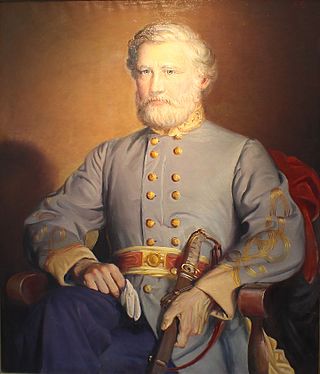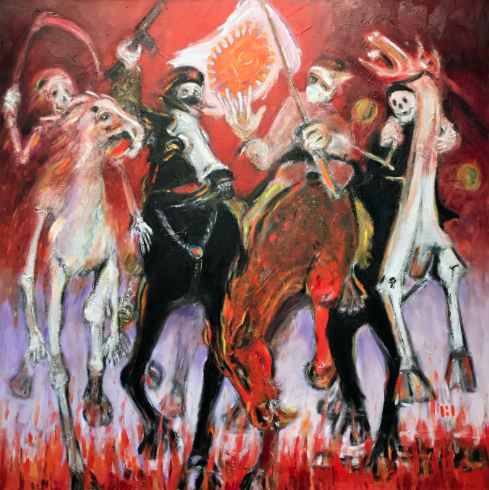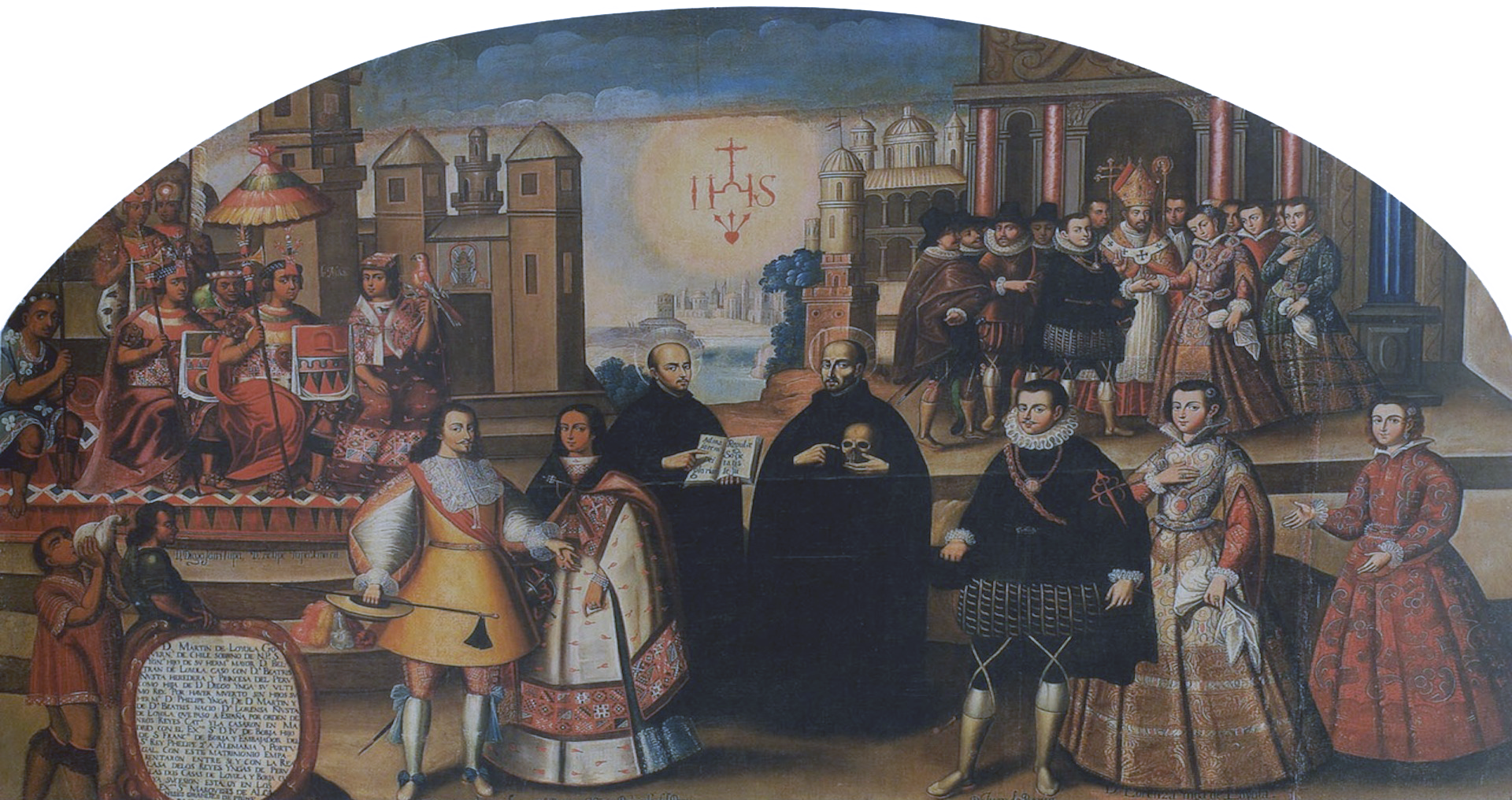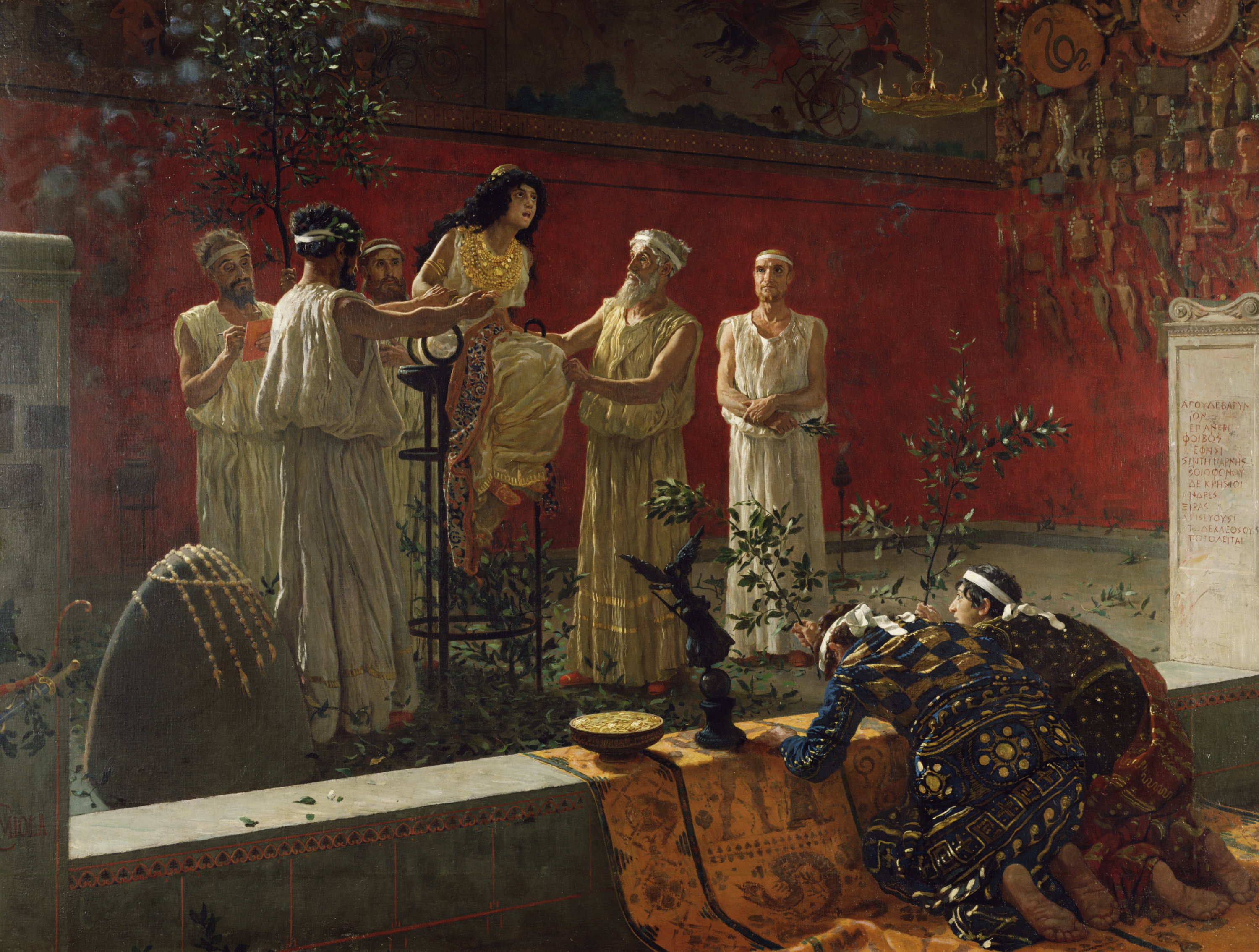As I promised Patrick on this thread, I started reading Thomas Hubbard’s, Homosexuality in Greece and Rome, available online.
After reading at least the introduction my opinion remains the same. The only type of homosexuality tolerated in a Fourth Reich should be that of two adolescents beautiful enough not to cause revulsion in a heterosexual who sees them together.
Below I reproduce some excerpts from the introduction to Hubbard’s book, omitting the bibliographical references. As can be seen, homoeroticism was not always accepted in Greece and Rome:
______ 卐 ______
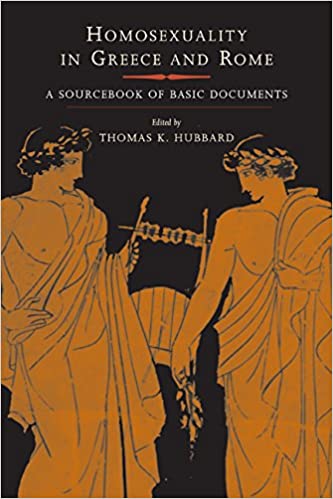 In Wasps, Aristophanes assures his audience that his tastes are not pederastic, and comedy generally ridicules those who seem exclusively or excessively devoted to boys or men, as if to imply that their preferences were not the norm, but they were nevertheless a recognizable group in ancient Athens. Roman satirical texts from authors such as Petronius, Martial, and Juvenal recognize that some men were genuinely incapable of sex with women…
In Wasps, Aristophanes assures his audience that his tastes are not pederastic, and comedy generally ridicules those who seem exclusively or excessively devoted to boys or men, as if to imply that their preferences were not the norm, but they were nevertheless a recognizable group in ancient Athens. Roman satirical texts from authors such as Petronius, Martial, and Juvenal recognize that some men were genuinely incapable of sex with women…
Artistic evidence also suggests that the symposium, or drinking party, was a locus of homosexual admiration, courtship, and even sexual acts.The tragedian Sophocles ogled cute serving boys, and in myth Ganymede was brought to Olympus to be the cupbearer of the gods and Zeus’ favorite. As figure 23 shows, serving boys would often tend to their duties naked. That Plato and Xenophon both set dialogues on love at such gatherings is significant. Most male homoerotic lyric poetry was probably intended for delivery in such a setting. 1.85, 1.88, and 1.89 are skolia (drinking songs) that may have been meant for recitation at banquets as an expression of homosocial values common to men of the upper class…
One should not necessarily assume from the number of references that such behavior was more common in Rome than it was in Greece: it may be that sexual passivity on the part of free citizen males was even more offensive to Roman sensibilities (for which it was not acceptable even in free youths) and hence became a potent satirical topos for moral disorder and inversion of values, as is suggested by the uniformly hostile tone of the sources.
Greek and Latin shared a term for such men: kinaidos/cinaedus. It may have been used as early as Archilochus. Its first certain attestations in Aristophanes are not distinctively sexual; it just appears as one of many terms of abuse for rascality. But by the fourth century its meaning is more specific: the orator Aeschines abuses Demosthenes as one, and Plato has Socrates refer to their life as “terrible and shameful and to be pitied”…
It therefore seems unwise to limit the term kinaidos/cinaedus to the sexually passive: its range seems potentially to include anyone who is perceived as sexually excessive or deviant. I have therefore adopted the somewhat unsatisfactory translation “pervert” in numerous passages throughout this volume, inasmuch as that English word combines the same vagueness of reference with an equally strong element of censure and disapproval. The cinaedi as a group are too often mentioned to be merely imaginary projections, however embroidered with fiction each individual story may be.Antiquity, like our own society, had its share of sexual dissidents and nonconformists.
Varieties of moral judgment
Just as sexual behavior in Greece and Rome was irreducible to any single paradigm, moral judgments concerning the various species of same-gender interaction were far from uniform. The widespread notion that a “general acceptance” of homosexuality prevailed is an oversimplification of a complex mélange of viewpoints about a range of different practices, as is the dogma that a detailed regimen of protocols and conventions distinguished “acceptable” from “unacceptable” homosexual behaviors.
There was, in fact, no more consensus about homosexuality in ancient Greece and Rome than there is today. In these heavily discourse-oriented cultures, as in our own, sexual dissidence was a flash point of ideological contention…
Although there is no question that comic invective holds the greatest scorn for effeminates and/or sexual passives, adult effeminacy was merely seen as the most extreme and visible manifestation of an institution (pederasty) that, even when practiced in a “normative” way, effeminized, prostituted, and corrupted adolescents who were one day destined to become the city’s leaders…
The sum of this evidence, together with the association of pederasty with upper-class venues like the symposium and wrestling school, suggests that it was primarily an upper-class phenomenon, at least in Athens; only men with a certain amount of wealth, leisure, and education were in a position to provide boys with the attention and courtship gifts they might expect, whether tangible or intangible. The majority of Greek men lived close to the subsistence level and had neither the time nor the wherewithal for such pursuits.
Even within elite intellectual circles there were many Greeks who had their doubts about any physically consummated form of pederasty. Xenophon’s Memorabilia presents a Socrates who cautions his young followers against pederastic involvements; and Xenophon’s Symposium seems to place a higher valuation on heterosexuality at the end. “Platonic love,” as articulated in Plato’s Symposium and Phaedrus, attempts to rehabilitate pederastic desire by sublimating it into a higher, spiritual pursuit of Beauty in which the sexual appetite is ultimately transcended. The idea of a chaste pederasty gained currency in other fourth-century authors, and may have some precedent in Spartan customs, but Plato’s last work, the Laws, appears to abandon it and present an entirely negative view. Even in the Phaedrus, Lysias’ speech and Socrates’ first speech flesh out serious and specific reflections on the harm that the wrong kind of pederasty could do a boy, suggesting that the concept of Platonic love was developed as a response to widespread censure. Texts such as the comic fragment 3.29 show that even in Plato’s own day, some were skeptical whether such a chaste pederasty could exist in reality; later satirical texts take it for granted that these philosophical pretensions were fraudulent covers.
Censure of same-gender relations in Roman culture was differently motivated: class considerations played less of a role, and the inappropriateness of sexual passivity for a Roman male, even during his youth, is the central theme of many texts. Some texts go further and condemn active forms of pederasty, even when practiced with a slave or foreigner: this preference is either impugned as Greek and un-Roman or singled out as a sign of luxury and self-indulgence. Roman oratory, like its earlier Greek counterpart, assumes an audience that is generally hostile to all forms of homosexuality, whether active or passive. Despite the libertarian utterances of some early Stoics (5.21–22), Stoic philosophy of the Roman period was profoundly negative concerning any form of sex that could be considered “against Nature”, a philosophical objection some sources advanced even during the Greek period.
Power dynamics
To the extent that literary texts display a power differential, it is rather to emphasize the powerlessness and even emotional helplessness of the lover and a privileged position of control occupied by the beloved youth: this configuration permeates Greek lyric texts from the archaic to the Hellenistic period. Even poems in which a lover congratulates himself on becoming free of a youth’s tyranny or admonishes the youth to beware of the future reflect a sense of desperation on the part of an unsuccessful lover. These protestations should not be dismissed as merely hollow convention.
Whatever advantage an older lover might have in experience, social connections, or verbal charm, the youth had the countervailing power of Beauty on his side, which was a rarer commodity. Simple demographic reckoning tells us that eligible youths in that short-lived, but most desirable, window of efflorescence (from about fourteen to eighteen) were far fewer in number than the adult lovers who might pursue them (Greek men typically did not marry until their thirties). And even among the demographically eligible, many boys would either not be interested or would be closely guarded by their fathers or pedagogues (slave attendants); others would prefer the company of youths closer to their own age (as implied by Socrates’ proverb “youth delights youth”). It was emphatically a seller’s market. Vases seldom show more boys than wooers, but often the reverse; vases often show boys rejecting advances or acting noncommittal. Boys like Lysis and Charmides are surrounded by a mob of admirers in Plato’s dialogues, and even the hypothetical boy addressed in Lysias’ and Socrates’ discourses in the Phaedrus is assumed to have his choice among several lovers and non-lovers (the latter being a less emotionally heated version of the former)…
The most desirable boys were precisely those from elite families, like Alcibiades or Timarchus, and the goal of a pedagogical mentorship was not to objectify and subordinate them, but to advance their socialization into the elite male world of the symposium and athletics, and eventually politics and the life of the mind…
If the Greeks’ principal interest in pederasty were as an institutionalized phallic confirmation of the sociopolitical supremacy of adult citizen males, one would expect far more attention to pederastic relationships with slaves, as in Rome, or with lower-class boys. But as we have seen, it was boys of the best families who were most likely to attract admirers.
Origin and chronological development
Most previous discussions of Greek and Roman homosexuality, although distinguishing between the two cultures, tend to treat each culture synchronically, as if attitudes and practices were relatively uniform over time.However, reflection on the various social practices of homosexuality and swings in public attitudes toward it in Western societies just in the second half of the twentieth century should caution us against such static assumptions in the case of ancient societies, which bore witness to many equally wrenching social and political transformations. One advantage of gathering texts together in the format this volume provides is that it allows detailed consideration of significant chronological developments within both Greece and Rome.
The origin of institutionalized homosexual practices in Greece has been a matter of considerable speculation and controversy, with some scholars tracing it back to Indo-European or Minoan origins.Ancient texts variously credit the Spartans or Cretans with a special role as early practitioners, particularly in what may be initiatory contexts. Some lyric texts and the Thera graffiti may support an initiatory interpretation.The earliest artistic evidence is Cretan and suggests a partnership of younger and older warriors. Aristotle connects the introduction of the practice with overpopulation and the desire for a lower birthrate, possibly through delayed marriage. Our earliest textual evidence is from the early seventh century, although Plutarch relates an incident that, if historical, must have occurred around 735–730 b.c.e. There is no clear evidence for homosexuality in the epic poetry of Homer and Hesiod,which could support a thesis of seventh-century origins, possibly in response to population issues.
The evidence is far more substantial for the fifth century and later, when one can note a progressive diminution in the status of pederasty at Athens, apparently in conjunction with the growth and radicalization of the democracy. In the earliest decades of the fifth century stands the legend of the tyrannicides Aristogeiton and Harmodius, who are credited (falsely) with a decisive role in overthrowing the Peisistratid dynasty and inaugurating democratic self-governance. Their legend should be seen as an attempt to situate the practice of upper-class pederasty within the emergent democratic ideology. Art historians have noted that scenes of uninhibited pederastic courtship and sex are common on Athenian vases until about 460, parallel to the celebration of pederastic love in the lyric poets; afterward, however, such representations (and, indeed, even explicit heterosexual scenes) virtually disappear in favor of much more coded arrangements, as in figs. 23–24.This movement away from a libertine and hedonistic artistic style toward more prudish and “family-oriented” modalities seems to parallel the sexual conservatism and enforcement of moral norms evident in comedy and oratory of the late fifth and early fourth centuries, which, as we have seen, appeal emphatically to popular tastes and democratic values. Indeed, Thucydides’ demythologizing critique of the Aristogeiton and Harmodius legend should be interpreted in the same light. The ethics of self-restraint in regard to boys that is praised by Xenophon also attests a growing moral problematization of pederasty in this period. It may not be incorrect to read the evolution of “Platonic love” in fourth-century texts as an attempt to rehabilitate pederasty by imagining a more modest and ethically acceptable form of the institution within a social environment that increasingly marginalized traditional pederasty as both nondemocratic (i.e., upper-class) and corrupting (i.e., teaching venality).
In Rome attitudes toward homosexuality experienced equally significant chronological developments…
During the second century b.c.e., a number of moralistic texts and utterances reject male love altogether, even involving slaves, or worry about the effeminization of Roman manliness under the growing influence of Greek cultural mores. This contrast between Greek and Roman, together with the perception, which may or may not have been historically accurate, that pederasty was imported into Rome from Greece, also becomes a leitmotif in late republican discourse. Cicero feels free to use any association with homosexuality against his rhetorical opponents. It should not surprise us that sexuality became problematized at a time when Rome’s national identity and political system were undergoing such profound transformations: indeed, the poet Catullus uses metaphors of sexual domination to express the loss of political liberty with the demise of the Republic.
By the Augustan period, however, Rome’s political destiny appeared settled and Greek cultural influence was taken for granted. Even if pederasty in the Greek style was still not fully assimilated, it appears to have been considered less of a threat. In moral and satirical texts of the first century c.e. and later, same-gender relations are often the focus of critical comment, but Greek influence is no longer the issue so much as the morally debilitating effects of wealth, power, and appetitive excess, all tendencies observable at the acme of the Roman Empire and embodied in the personae of the emperors. More detailed discussion of these developments in both Greek and Roman moral attitudes is better left to the introductions to the individual chapters.

